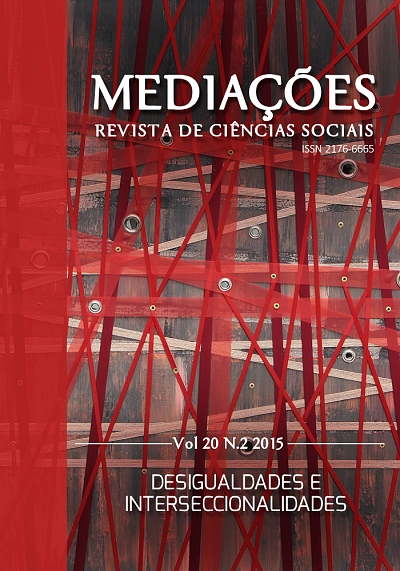Inequalities and intersectionality: unraveling the complex web of hierarchies and agencies
DOI:
https://doi.org/10.5433/2176-6665.2015v20n2p11Keywords:
Inequalities, IntersectionalitiesAbstract
The challenge of understanding the dynamics (re) producing inequalities is an ever-present topic in the social sciences and animates a wide range of research. In the different theoretical fields that seek to illuminate this research agenda, there is a growing recognition that the use of intersectional analyzes has increasingly enabled contributions with a high heuristic value. One of the reasons for the recent construction of this consensus around the notion of intersectionality is due to the recognition that, in view of the complexity of the production processes of social inequalities and political identities, it is necessary to see not only the interconnection of the logics that produce the different forms of oppression and privilege, but also the potential for making resistance movements visible, recognizing the subjects' agency and autonomy processes.Downloads
References
BRAH, Avtar. Diferença, diversidade e diferenciação. Cadernos Pagu, Campinas, n. 26, p. 329-376, jan.-jun. 2006.
BUTLER, Judith. Fundamentos contingentes: o feminismo e a questão do "pós modernismo". Cadernos Pagu, Campinas, n. 11, p. 11-42, 1998.
BUTLER, Judith. Problemas de gênero: feminismo e subversão da identidade. Rio de Janeiro: Civilização Brasileira, 2003.
CRENSHAW, Kimberle. Documento para o encontro de especialistas em aspectos da discriminação racial relativo ao gênero. Revista Estudos Feministas, Florianópolis, v. 10, n. 1, p. 171-188, 2002.
CRENSHAW, Kimberle. Mapping the margins: intersectionality, identity politics, and violence against women of color. Stanford Law Review, Stanford, v. 43, p. 1241-1299, 1991.
FACIOLI, Lara; MISKOLCI, Richard. Conectadas: experiências de subalternidade e ajuda mútua feminina online entre mulheres de classes populares. Mediações, Londrina, v. 20, n. 2, p. 129-159, jul.- dez. 2015.
HENNING, Carlos Eduardo. Interseccionalidade e pensamento feminista: as contribuições históricas e os debates contemporâneos acerca do entrelaçamento de marcadores sociais da diferença. Mediações, Londrina, v. 20, n. 2, p. 97-128, jul.- dez. 2015
JEOLÁS, Leila; SANTOS, Luiz Antonio de Castro. Jovens, percursos e atividades arriscadas nas corridas ilegais de carros: o risco como componente identitário. Mediações, Londrina, v. 20, n. 2, p. 262-283, jul.- dez. 2015.
LACLAU, Ernesto; MOUFFE, Chantal. Hegemonía y estratégia socialista: hacia uma radicalización de La democracia. Buenos Aires: Fondo de Cultura Econômica, 2006.
MACEDO, Renata Guedes Mourão. Trabalho doméstico, consumo e interseccionalidade: possibilidades de agência na trajetória de uma (ex) empregada doméstica. Mediações, Londrina, v. 20, n. 2, p. 184-207, jul.- dez. 2015.
MARIANO, Silvana Aparecida. O sujeito do feminismo e o pós-estruturalismo. Revista Estudos Feministas, Florianópolis, v. 13, n. 3, p. 483-505, set.- dez. 2005.
NUSSBAUM, Martha. Capabilities as fundamental entitlements: sen and social justice. Feminist Economics, London, v. 9, n. 2-3, p. 33-59, 2003.
NUSSBAUM, Martha. Las mujeres y el desarrollo humano: el enfoque de las capacidades. Barcelona: Herder Editorial, 2002.
SARDENBERG, Cecilia. Caleidoscópios de gênero: gênero e interseccionalidades na dinâmica das relações sociais. Mediações, Londrina, v. 20, n. 2, p. 56-96, jul.- dez. 2015.
SÁ VILAS BOAS, Marie-Hélène. Deliberating on interseccionality: women's conferences in Recife. Mediações, Londrina, v. 20, n. 2, p. 208-234, jul.- dez. 2015.
SEN, Amartya. Desigualdade reexaminada. 2. ed. Rio de Janeiro: Record, 2008.
SEN, Amartya. O desenvolvimento como expansão da capacidade. Lua Nova, São Paulo, n. 28-29, p. 313-334, 1993.
SEN, Amartya. Teorías del desarrollo a principio del siglo XXI. Mimeo, 2004.
Downloads
Published
How to Cite
Issue
Section
License
Copyright (c) 2015 Silvana Aparecida Mariano, Márcia dos Santos Macêdo

This work is licensed under a Creative Commons Attribution 4.0 International License.
Copyright on articles published in Mediações belongs to the author(s): in the case of partial or entire republication of the original publication, we ask author(s) to indicate the original publication in the periodical.
Mediações uses the Creative Commons Attribution 4.0 International license, which allows Open Access, enabling any user to read, download, copy and disseminate its content so long as adequately referenced.
The opinions expressed by the author(s) are their sole responsibility.
































